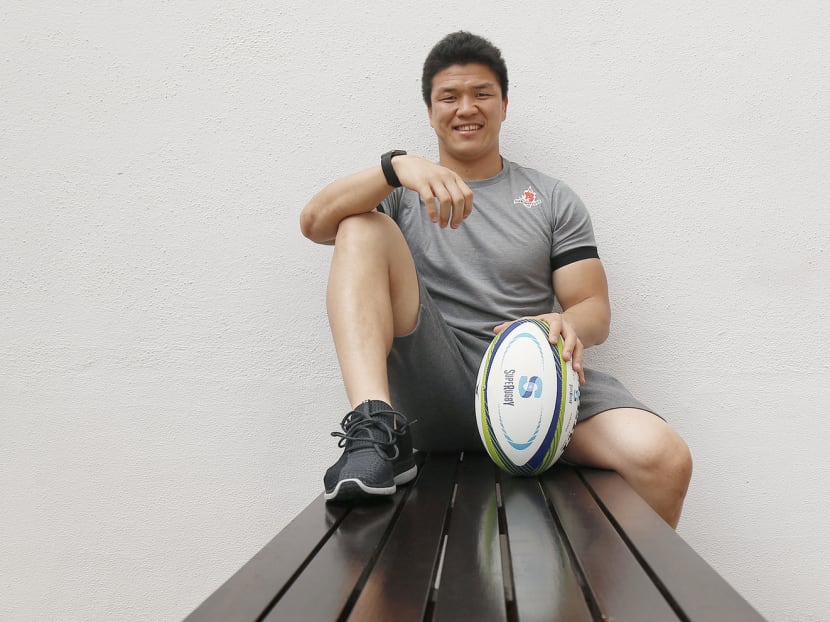Sunwolves will get stronger thanks to 2019 Rugby World Cup
SINGAPORE — Since the Hito-Communications Sunwolves made their Super Rugby debut last year, they have failed to win any of their matches in Singapore.

Sunwolves co-captain Harumichi Tatekawa, who also leads the Japanese national team, hopes his team will repay the strong support the team enjoys in Singapore by defeating the Sharks tomorrow. Photo: Najeer Yusof
SINGAPORE — Since the Hito-Communications Sunwolves made their Super Rugby debut last year, they have failed to win any of their matches in Singapore.
But local supporters can look forward to more competitive and much-improved performances over the next two years from the Japanese franchise team, who are expected to include more core players from the national team as part of their preparations for the 2019 Rugby World Cup (RWC).
Of the 25 squad members for tomorrow’s Super Rugby clash with South Africa’s Sharks, 17 are current Japan internationals.
Nine of the Sunwolves members for this season played in the previous RWC in 2015, including the likes of Shota Horie, Takeshi Hino, Takeshi Kizu and current captain Harumichi Tatekawa.
The international experience in the Sunwolves will only increase next season, with the expected arrivals of former skipper Michael Leitch and fullback Ayumu Goromaru, who were key players in the 2015 World Cup.
Japan, nicknamed the Brave Blossoms, aim to give a good account of themselves when they become the first Asian nation to host the RWC and Tatekawa believes that being part of the Sunwolves offers invaluable exposure. “We have the opportunity to play against high-level teams and by experiencing these games, we can gain great experience,” the Sunwolves co-captain told TODAY yesterday at the Pan Pacific Hotel.
“The game speed is very fast and the physical contact (aspect) is top level in the world. If you are only staying in Japan (to play), you are unable to experience such a high level, so it’s great to be able to experience that.
“I am sure we are (in the process of) deciding (on) the core members of the national team (for the World Cup) and the young ones will have the opportunity to play for the Sunwolves also, so that we are able to compete among each other and the level of Japan’s rugby as a whole will increase as a result.”
The Sunwolves have won just one of their 10 matches this season — as many as they did last year — and appear to be struggling, on the surface, but Tatekawa feels the team has shown improvement.
The 27-year-old hopes this will translate to an upset against the Sharks at the National Stadium, their designated second “home” for the Super Rugby competition. The Sunwolves play three matches here every season, but have drawn one and lost four of their previous five.
“Despite the high scores (in our defeats), we are able to communicate really well,” he said. “This is the time to show results.
“I feel that we are very well supported here, so we would like to achieve a result for them (fans) ... we haven’t won in Singapore yet, so we’d like to win.”
Tatekawa is quietly confident that Japan, who have played in every World Cup since the inaugural edition in 1987, will progress past the pool stage for the first time come 2019, having been handed a favourable draw.
The Brave Blossoms are grouped with Ireland and Scotland in Pool A, along with two yet-to-be-determined countries. “Teams like (favourites) Australia, New Zealand and England, we don’t need to play against them,” he pointed out.
“I think it’s great advantage for us. The competition is in Japan and the other teams are from Europe, which could be an advantage for us (in terms of climate) ... (but) we need to prepare well and have the right tactics.”
Japan stunned the world when they beat former world champions South Africa in their opening group game at the last World Cup for their first victory in the tournament since 1991, before going on to record two more wins. However, they narrowly missed out on qualifying for the last eight.
Nevertheless, their performances boosted the profile of the sport back home, with the players heralded as heroes.
Goromaru, for example, had a bronze statue made in his image, as well as a baby giraffe named after him.
Tatekawa believes it is important to build on that support and take rugby to the next level.
“It’s not a major sport (still) but more people know about it now ... we are in the media more often too,” he said, adding that more players are being recognised in the streets and being asked for autographs.
“In 2015, we couldn’t get to the top eight, so we have to have a better result (in 2019) — otherwise we won’t be able to change the future of Japanese rugby ... the result will therefore be very crucial.”
EVENT INFO
The Sunwolves play the Sharks at the National Stadium on Saturday (7.55pm).
Before that, Raffles Institution will take on Anglo-Chinese School (Independent) in the National Schools A Division rugby final (5pm)
Visit http://www.sportshub.com.sg/sportshubtix/Pages/Super-Rugby-2017.aspx for more information on the Sunwolves-Sharks game.





